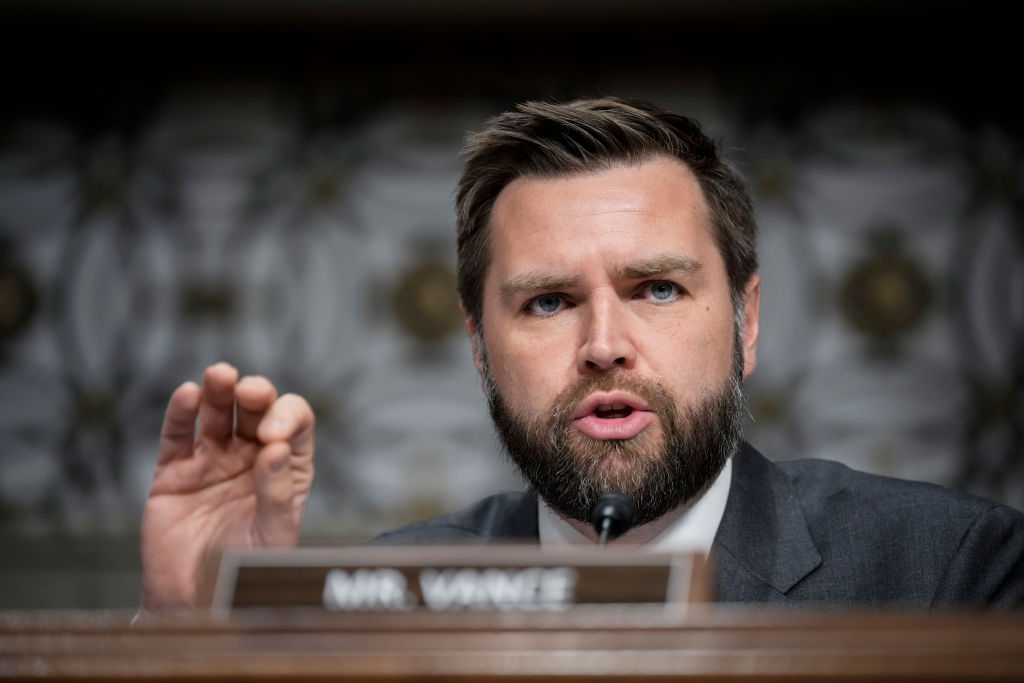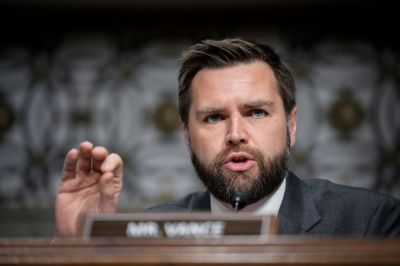Oren Cass has long been a controversial figure on the right. But the political adviser’s vision for a new conservative economic agenda is finding a receptive audience with some GOP lawmakers.
Republican Sens. Marco Rubio, J.D. Vance, Todd Young, and Tom Cotton joined Cass Wednesday at a forum hosted by his think tank, American Compass, which advocates a family- and worker-centered conservative economic plan that seeks to combat what Cass and others say are the shortcomings of free-market fundamentalism. American Compass’ goal for the forum was to boost its new policy handbook, which recommends measures such as bolstering collective bargaining, embracing social insurance (think Social Security and Medicare) over means-tested welfare, and allowing the discharge of student debt in bankruptcy.
“The industrial commons requires protection, to ensure that its capital base, talent pool, and centers of innovation fuel productivity gains and provide for the national defense,” Cass writes in the handbook’s foreword. “So does the labor market, to ensure that the nation’s workers are essential to economic success and prepared for contributing to it. So does the social fabric, to ensure a sense of place, caring relationships built on mutual obligation, and the solidarity to solve problems and counter threats.”
Rubio has been at the forefront of this new economic agenda for years, foreshadowing Cass’ argument that “Adam Smith’s ‘invisible hand’ is an explanation of how capitalism can work, not a promise that it will” in a 2019 speech at Catholic University.
“I think the right-of-center is as guilty as the left-of-center on the idea that we’re all just consumers and investors in the global economy,” Rubio said Wednesday, arguing instead that a strong market should be a means to an end, rather than an end itself. Lawmakers should resist the urge to allow businesses to dictate their agenda since the interests of corporations don’t always align with those of the country, he argued.
That view—that government intervention is sometimes needed when market outcomes don’t align with the national interest—has materialized recently in bipartisan legislation.
In the wake of the East Palestine, Ohio, train derailment in February, Republican lawmakers including Rubio and Vance called for heightened regulations to protect workers and public safety. And Vance, Rubio, and Sens. Josh Hawley and Mitt Romney have embraced Cass’ post-Roe, family-centric approach to welfare policy.
Romney in particular has broken with many of his colleagues with his deficit-neutral proposal to expand the child tax credit into a monthly cash allowance for families with school-aged children. The plan drew criticism from Rubio, even as the two paired up on a separate paid parental leave program.
Last year, 17 Republicans joined Democrats to support the protectionist CHIPS Act, which aimed to strengthen domestic semiconductor manufacturing, and now, some Republican lawmakers are reaching across the aisle to strengthen oversight of banks following the high-profile collapse of Silicon Valley Bank in March. After the bank failed, the Federal Reserve, the Federal Deposit Insurance Corporation, and the White House called for stronger regulations to prevent similar, potentially more catastrophic bank failures in the future.
The Senate Banking Committee voted Wednesday to advance bipartisan legislation from Sens. Sherrod Brown, a Democrat, and Tim Scott, a Republican, to hold executives of failed banks accountable after reaching a compromise with Vance and Democratic Sen. Elizabeth Warren, who had been pushing a tougher bill.
But not all conservatives are on board with Cass’ new vision.
He has long drawn the ire of his fiscally conservative peers on the right. Since his work on Romney’s 2008 and 2012 presidential campaigns, Cass has professed his views on the need for a new direction to anyone who will listen. Many on the right, though, still see his ideas as antithetical to conservative values of free-market capitalism and individual responsibility.
Many Republican lawmakers have remained steadfast in their support of so-called “Right-to-Work” laws, which eschew Cass’ call for a “balanced view of support for collective bargaining.”
Some economists also challenge the basis for his policy proposals: the conclusion that American families are struggling more than ever to afford a middle-class lifestyle.
In a report for the American Enterprise Institute, University of Central Arkansas economics professor Jeremy Horpedahl and Scott Winship, the director of AEI’s Center on Opportunity and Social Mobility, criticized American Compass’ policy recommendations. Echoing other critiques, they point out a few potential fallacies in Cass’ Cost-of-Thriving Index, a calculation he uses to argue that the cost of thriving has increased dramatically since 1985 while wages have stagnated. One of Cass’ problems, they say, is his opposition to conventional inflation adjustment.
“More than any other organization, American Compass has blurred the lines between conservatism and progressivism by trotting out the same factually incorrect doomerism the left has relied on for decades,” they wrote last week for The Dispatch.
And last month, Samuel Gregg of the American Institute for Economic Research argued that the new right’s polemics and interventionist policies are counterproductive for American prosperity. Gregg was responding to Michael Lind’s new book Hell to Pay: How the Suppression of Wages is Destroying America, which makes assumptions similar to those underlying Cass’ book and calls for the development of a new “national developmentalism” grounded in organized labor.
Whether or not the policy ideas are grounded in empirically sound evidence, though, former President Donald Trump’s embrace of populist economic ideas has resulted in what Rubio characterized as a “tectonic shift.”
“I believe this is a realignment in American politics. Not just a partisan realignment, but the very ideological spectrum is evolving,” he said at the forum.
This realignment has been reflected in voting trends. In 2021, Pew Research Center added “Populist Right” to its political typology scale, which classifies voters as one of nine distinct ideological groups. Pew considers nearly a quarter of Republican and Republican-leaning voters “populist right.”
Populist right voters—who overwhelmingly support Trump—harbor hostile views toward the government, but they also distrust business. When asked by Pew in 2021 if “the economic system in this country unfairly favors powerful interests,” 87 percent of the group agreed, putting them at odds with other Republican ideological groups who were all more likely than not to disagree with the statement.
But—aside from Trump—2024 GOP presidential candidates have been slow to embrace the new right’s policy prescriptions.
Florida Gov. Ron DeSantis is trying to harbor Trump’s appeal on social issues, but he’s been hesitant to call for pro-labor policy. Former South Carolina Gov. Nikki Haley, who leans into her reputation as a foreign policy hawk, doesn’t seem keen to embrace the protectionist pieces of the populist project. Scott (also of South Carolina) is running on an optimistic view of America that clashes with the “economic doomerism” at the heart of the new agenda. And former Vice President Mike Pence and former New Jersey Gov. Chris Christie, mainstays of the Republican old guard, are hesitant to jump ship from the party’s more traditional economic policies.
But the Republicans who have joined Cass’ movement aren’t interested in maintaining the free-market orientation of past movements.
“The solution is not, ‘Oh, we need to go back to the pre-Trump consensus,’” Vance said at the forum Wednesday. “Even if you don’t like Donald Trump—which I obviously do, I think he’s done a lot for the country—even if you don’t like Donald Trump, the answer is not to go back to what came before.”






Please note that we at The Dispatch hold ourselves, our work, and our commenters to a higher standard than other places on the internet. We welcome comments that foster genuine debate or discussion—including comments critical of us or our work—but responses that include ad hominem attacks on fellow Dispatch members or are intended to stoke fear and anger may be moderated.
With your membership, you only have the ability to comment on The Morning Dispatch articles. Consider upgrading to join the conversation everywhere.